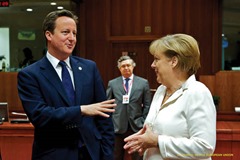The European Council at work
 Peter Cheney explains how decisions by EU leaders translate into policy back home.
Peter Cheney explains how decisions by EU leaders translate into policy back home.
Four times a year, David Cameron reports to Parliament on the outcomes of the European Council – the gathering of the EU’s political leaders.
Council meetings bring together the heads of state or government of all 28 member states. Most are prime ministers but France, Cyprus, Lithuania and Romania are represented by their presidents. The Council’s political make-up regularly changes to reflect voters’ allegiances. At present, 12 members are conservative, 10 are socialist (including new Greek Prime Minister Alexis Tsipras), five are liberal and one is independent.
Members may, of course, disregard manifesto commitments and they also need to strike compromises to get business through the Council. Its overall aim is to set the EU’s strategic agenda.
The first informal European summit was convened by Charles de Gaulle in 1961 as a counterweight to the European Commission. The summit was renamed as the European Council when it met in Dublin in 1975 but it only became a formal institution in 2009 when a full-time President was appointed. The post is currently held by Donald Tusk.
December’s meeting focused on investment, economic reform and the Ukraine crisis. Leaders backed the creation of the €315 billion European Fund for Strategic Investment and asked the Commission to establish this by June 2015. Applicants from Northern Ireland will be able to compete with all other EU regions and the fund will particularly focus on investment in the digital economy, energy and transport and support for SMEs and young unemployed people.
Commenting afterwards, David Cameron called for more detail on what investment and reform would entail. Britain’s priorities included more deregulation and liberalisation of services, the completion of the digital single market, and a free trade deal between the EU and USA.
Northern Ireland interacts with the Council in three main ways.
Under the Northern Ireland Act 1998, the Executive is obliged to implement commitments made by the UK Government at summits.
Ministers and their officials have the opportunity to comment on the UK’s position at Joint Ministerial Committee meetings held before each European Council. These are chaired by the Minister for Europe, David Lidington. The meetings themselves are monitored by MEPs and the Office of the Northern Ireland Executive in Brussels. These also tend to be quieter days for the other EU institutions and offer a good opportunity for visitors to set up meetings with officials.
Finally, local MPs can lobby the Prime Minister on what should be discussed at the Council and hold him to account when he returns. Nigel Dodds, for example, had asked Cameron to consider more help for Syrian refugees in Europe but the issue was not discussed in December. The next summit will take place on 19-20 March.





